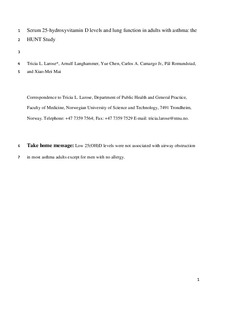Serum 25-hydroxyvitamin D levels and lung function in adults with asthma: the HUNT Study
Larose, Tricia L; Langhammer, Arnulf; Chen, Yue; Camargo, Carlos A; Romundstad, Pål Richard; Mai, Xiao-Mei
Journal article, Peer reviewed
Accepted version
Permanent lenke
http://hdl.handle.net/11250/2445765Utgivelsesdato
2015Metadata
Vis full innførselSamlinger
Sammendrag
The association between vitamin D status and lung function in adults with asthma remains unclear.
We studied this cross-sectional association and possible modification by sex and allergic rhinitis in 760 adults (aged 19–55 years) with self-reported asthma in the Nord-Trøndelag Health Study. Serum 25-hydroxyvitamin D (25(OH)D) level <50 nmol·L−1 was considered deficient. Lung function measurements included forced expiratory volume in 1 s (FEV1) % predicted, forced vital capacity (FVC) % predicted and FEV1/FVC ratio. Multiple linear regression models were used to estimate adjusted regression coefficients (β) and 95% confidence intervals.
44% of asthma adults had serum 25(OH)D levels <50 nmol·L−1. Its associations with lung function measures seemed to be modified by sex and allergic rhinitis (p<0.03 for three-way interaction term). Overall, a serum 25(OH)D level <50 nmol·L−1 was not associated with lung function measurements in subjects with allergic rhinitis in this asthma cohort. In men with asthma but without allergic rhinitis, however, a serum 25(OH)D level <50 nmol·L−1 was significantly associated with lower FEV1/FVC ratio (β=−8.60%; 95% CI: −16.95%– −0.25%).
Low serum 25(OH)D level was not associated with airway obstruction in most asthma adults with the exception of men with asthma but without allergic rhinitis.
